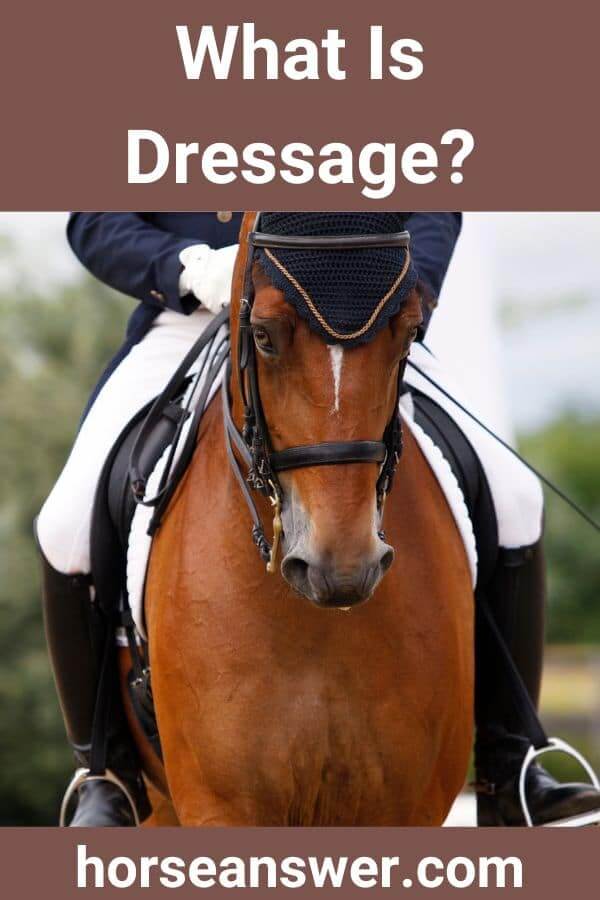What Is Dressage? (Explained!)
I’ve always been a fan of horse racing.
Since I was a little boy, I’ve always loved seeing the horses, witnessing the exciting races, and just generally having a great day out.
I’ve always had such a one-track mind, though, that I never expanded my interest into the wider world of horse shows.
Recently, I decided I was going to try a different variety of horse shows.
One that I’m always hearing people mention is dressage, but it occurred to me I didn’t really know what it was.
So, I decided to look into it.
So, what is dressage?
Dressage is a form of horse riding, usually done as part of exhibition and competition, in which the horses are trained to their highest natural athletic ability in order to maximize their potential as a riding horse. Horses can demonstrate incredible ability to respond to minimal instruction.
Dressage involves a few different activities, then, but the essential goal is to have an incredibly well-disciplined horse.
The best dressage horses will do exactly what the rider wants with only the barest instruction—indeed, the best dressage riders simply look like they’re doing nothing but sitting there.
What is the purpose of dressage?
When you watch a dressage show, you might be a bit confused about what the whole purpose is.
To the untrained eye, it can simply look like several minutes of aimless prancing.
There’s no show of speed or special agility like you might see in racing or show jumping.
But, the whole purpose of dressage is simply discipline.
Dressage horses are some of the most highly trained, attentive and in-tune horses out there.
Dressage is about the horse being able to carry out all sorts of unusual and sometimes difficult to learn manoeuvers with only the barest instruction from the rider.
The best dressage horses can make all kinds of strange movements which a horse would probably never make naturally, such as sideways trotting or rhythmically pounding its feet on the ground in an apparent show of their skill.
Dressage competitions generally consist of a series of individual tests with heightening levels of difficulty.
Judges determine the horse’s ability level and how it performed, and give them a score based on a scale of 1-10.
These scores are judged primarily based on the dressage movements, but also on attributes like the horse’s gait, submission, impulsion and the rider’s performance.
Horses that perform the best at dressage are essentially the most highly trained and highly disciplined horses in the world.
Success in dressage can lead to success in all sorts of other shows.
So, what about the ethics of the practice?
Is dressage cruel to horses?
The simple answer is that the highest level of dressage competitions are very well regulated, and these competitions are not cruel to the horses.
For the most part, this is largely true of dressage shows, since any official show is regulated by an equestrian body.
There is nothing inherently cruel about dressage, when it is done right.
That said, dressage is a big industry, and this can, naturally, lead to some levels of mistreatment and cruelty.
There is a big incentive to attempt to forcefully and rapidly train a horse for dressage in order to make it perform better at the show.
There can be lots of money and prestige involved in these shows.
There are a few inherent factors of dressage which some claim are cruel.
Noseband tightening is used in dressage to keep the horse’s mouth closed for a whole number of reasons.
This has been known to cause changes in a horse’s behavior, and even cardiac irregularities.
Shock collars are also used to tame horses, and this can have a severe effect on a horse.
It can damage their neck and cause serious pain.
Shock collars are not always used, but many animal rights activists suggest that dressage competitors wish to win at any cost, including these cruel measures.
So, what’s really important is that dressage is heavily regulated.
The use of these kinds of tools must be expressly banned, and at the highest levels, these sorts of practices typically are.
Nonetheless, it still persists in some competitions.
How difficult is dressage?
So, how hard is dressage?
As I’ve said, the best dressage horses often represent the most well trained, disciplined horses in the industry.
Having a well disciplined horse isn’t much good if you yourself don’t know how best to communicate with it.
The hardest part is maintaining the horse’s composure.
This is as much down to the rider as it is to the horse.
As I said, the best dressage riders will look like they are simply sitting there, not doing anything.
The fact is, though, they are issuing countless verbal and non-verbal commands, and keeping a close eye on every little detail of what the horse is doing.
Dressage is far from easy, then.
Dressage, then, represents some of the most well-trained and intelligent horse alive.
It may look simple and even unimpressive to the untrained eye, but the fact is that it’s actually one of the most difficult sports to master.
Horse and rider must be totally comfortable and in commune with one another, or they will never make it in the dressage world.
